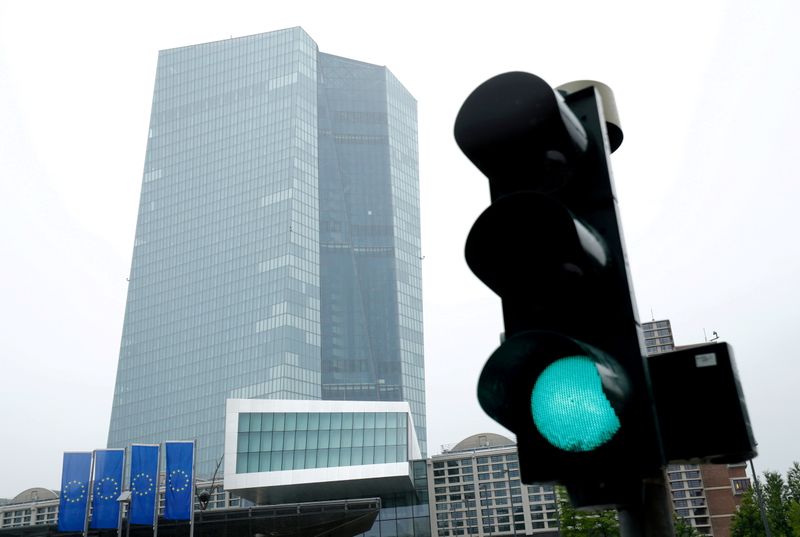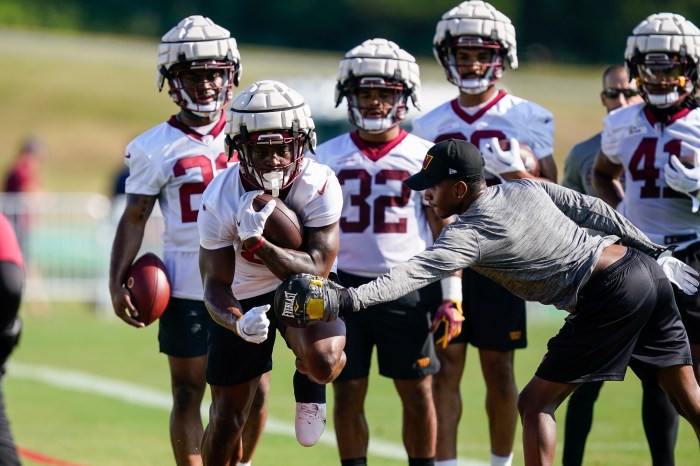LONDON (Reuters) – The European Central Bank said on Thursday it would slow bond purchases under its 1.85 trillion-euro Pandemic Emergency Purchase Programme (PEPP) from the 80 billion euros monthly pace registered in the past two quarters.
Markets reacted modestly to the move, which is a token step towards unwinding the emergency economic aid that propped up the bloc during the pandemic.
MARKET REACTION:
-Euro zone bond yields slipped while stocks cut losses and the euro rose after the ECB move
COMMENTARY:
ELGA BARTSCH, HEAD OF MACRO RESEARCH AT BLACKROCK INVESTMENT INSTITUTE
“The ECB is slowing the pace of its emergency asset purchase programme. But this is not a tapering decision, as ECB President Lagarde stressed during the press conference; it’s an operational decision given easier financing conditions right now. ECB asset purchases look here to stay as the new policy framework paves the way for looser for longer monetary policy in the euro area.
“The ECB’s priority should be to focus on bumping up medium-term inflation, since staff projections peg it well below the new 2% target. When PEPP ends, a faster pace of APP could help push inflation higher – although fiscal support might ultimately also be needed.”
JOE LITTLE, CHIEF GLOBAL STRATEGIST, HSBC ASSET MANAGEMENT
“In our view, the decision to reduce asset purchases is not tapering, but a reversal of March’s emergency uplift in purchases – which itself followed a market episode of rising bond yields. It means that in Q4, ECB asset purchases will look closer to the levels they were in Q1 this year.
“We think the bigger decision on asset purchases comes at the December ECB meeting. The new symmetric inflation target, subdued underlying inflation trends, and pandemic risks suggests a dovish tilt to policy for the foreseeable future. This is likely to include ongoing purchases under the Asset Purchase Programme (APP), and a possible extension of the PEPP deeper into 2022.
“Overall, with the ECB in no rush to significantly tighten policy, the recovery in the eurozone is set to continue amid high levels of vaccination, substantial savings piles, and the release of EU recovery funds.”
SEEMA SHAH, CHIEF STRATEGIST AT PRINCIPAL GLOBAL INVESTORS
“The ECB has taken its first meaningful step towards tapering today. Characteristically, it hasn’t tied itself to a specific pace of purchase, instead retaining an element of flexibility which will be helpful in the face of a potential tightening in financial conditions as Fed taper draws near.
“In the past week, market focus has shifted from when the Fed would begin to taper to when the ECB would reduce the pace of its purchases, so today’s announcement should not come as a surprise.
“Even so, with markets concerned about the risk of a hawkish policy error, Lagarde’s efforts to disconnect bond purchases from rate lift-off will be important in reassuring investors that the central bank isn’t on the verge of making a repeat of the 2011 policy mistake.”
PREMIER MITON CHIEF INVESTMENT OFFICER NEIL BIRRELL
“The ECB is preparing to adjust policy for higher inflation, although they are hardly talking about it getting out of control. They will continue to walk the tightrope of providing support and not hurting growth prospects.”
NATIXIS HEAD OF EUROPEAN MACRO RESEARCH DIRK SCHMACHER
“It is not technically tapering as they could still spend all of the envelope.”
AFS Group (AMSTERDAM) ANALYST ARNE PETIMEZAS
“Market seems to shrug off the taper language, as in the greater scheme of things the undershooting of the purchase commitment won’t be large, if they undershoot at all. And market had already moved on the taper stuff in past few weeks.
“Real hard decisions have been delayed: about what they are going to do with QE when PEPP ends in March, and what will happen when the TLTRO teaser rate expires in June.”
CAPITAL ECONOMICS CHIEF EUROPE ECONOMIST ANDREW KENNINGHAM
“The key change in today’s policy statement is that rather than repeating its commitment to conduct PEPP asset purchases at ‘a significantly higher pace than during the first months of the year’, the ECB now plans to purchase at a ‘moderately lower’ pace than in the previous two quarters.
“We suspect that this will translate to PEPP purchases of around €70bn per month, compared to over €80bn per month between May and July (and less during August). That would mean total purchases of €90bn per month including the €20bn per month under the APP in the coming quarter. Such a change will make a negligible difference to overall financing conditions.”
(Reporting by European markets team; Compiled by Sujata Rao; Editing by Tommy Wilkes)



















